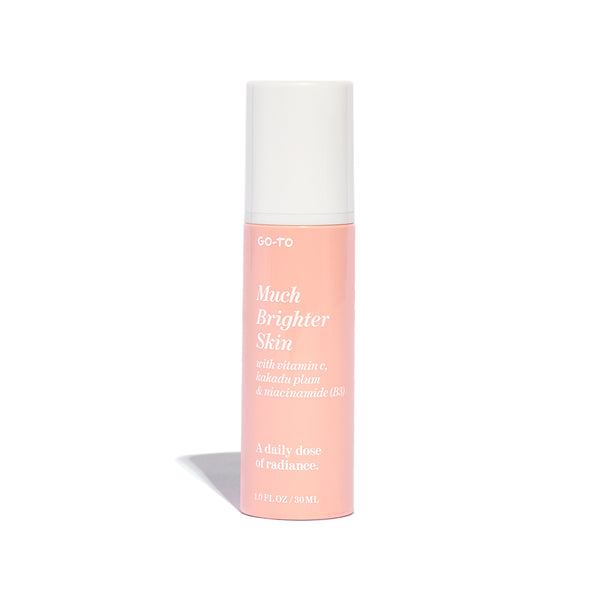5 Common Vitamin C Myths And Legends Set Straight
Lilith Hardie Lupica

When an ingredient is as wildly popular as vitamin c it’s only natural there’s much confusion around its uses, effects on the skin and efficacy.
Do those managing sensitive skin or acne need to steer clear? Will it cause havoc when paired with retinol? How about an SPF?
It’s only (b)right that we set the record straight and debunk these common myths once and for all, especially if you’re ready to dive into the world of vitamin c but feel mildly confused and cautious.
We’re here to dispel the five most common vitamin c myths:
Myth #1: All vitamin c's are the same
This one happens to be a ‘no’ but it’s way more complicated than simply yelling true or false at your medicine cabinet. Vitamin c is often used as an umbrella term but in its pure form it’s known as L-Ascorbic Acid. The confusion lies in the dozens of vitamin c derivatives and their nuances, think: sodium ascorbyl phosphate, L-ascorbate and magnesium ascorbyl phosphate, ascorbyl tetraisopalmitate to name a few.
Vitamin c derivatives are often more stable and oxidise at a slower rate, making them better for topical skincare formulations than pure, high strength forms that may cause irritation or become unstable. Finding the right vitamin c can take some time but understanding that each form brings with it a different set of pros and cons is half the battle.
Myth #2: Only some skin types can use vitamin c
Nope! All skin types can benefit from vitamin c, even the sensitive-skinned or acne-prone can join in. The key is to choose a gentle form of vitamin c (hello, sodium ascorbyl phosphate), be conscious of the percentage used in the formula (higher concentrations can be irritating) and slowly introduce the product into your routine.
Myth #3: Vitamin c causes sun sensitivity and should only be applied at night
Vitamin c does not cause sensitivity to the sun, it’s quite the opposite actually. Because vitamin c is an antioxidant it defends the skin against free radical damage caused by environmental aggressors (pollution, UV light, cigarette smoke, bad Tinder dates etc.) Because vitamin c is such a potent protector it’s often prescribed for daytime use (when skin needs it most!) alongside your SPF. That doesn’t mean you can’t apply vitamin c at night. However, because vitamin c is acidic it doesn’t always play well with other strong actives (retinoids, AHAs, etc.) it’s usually best to avoid layering these at the same time (cranky skin can occur) and slot ingredients known to cause sun sensitivity into your PM routine.
Myth #4: The higher the percentage of vitamin c, the better for your skin
Not quite! High percentages of vitamin c can be irritating and certainly don’t equate to better or faster results. The percentage of vitamin c used certainly effects the potency of a product, and formulations can run from 10 to 20% but a lot of factors influence the efficacy of a vitamin c product; pH levels (that acidity, again), the formulation itself (what’s it been paired with? Is it a serum or cream?), the type of vitamin c and its absorbability.
Why? Not all vitamin c derivatives are created equal, some don’t penetrate the skin easily (if it’s not absorbing, it’s wasting your time) and can be unstable (degrading/oxidising in quality). In short, some forms of vitamin c, even at lower percentages, can be more efficient in producing results if they’re known to penetrate the skin and be stable for longer periods of time.
Myth #5: Vitamin c doesn’t work with other active ingredients
Vitamin c has a bad reputation for being tricky and unstable but the ingredient, a supreme multitasker, isn’t as difficult as the internet or Lauren from sales will have you believe.
Vitamin c does pair well with other actives, especially niacinamide, hyaluronic acid and Vitamin E. Things get tricky when you consider pairing vitamin c with ingredients known to cause irritation like AHAs, BHAs and retinoids. It’s not that they can’t be used together but do approach with caution as layering too many actives can do more harm than good.
As mentioned above, opting into vitamin c for the day and ingredients that are known to cause sun sensitivity—AHAs, BHAs and retinoids—in the evening will save you time and upset skin. But! If they do happen to cross paths in the evening, this isn’t the worst thing in the world and the ingredients won’t negate the effects of each other, just be mindful of your precious moisture barrier.
A brightening serum for hydration, antioxidants, and your daily dose of radiance. No tackiness, no weird smell, just a very effective, very stable serum loaded with Vitamin C, niacinamide, and hyaluronic acid for bright, bouncy, skin.
Much Brighter Skin
Brightening Vitamin C Serum



